Nine million prescription opioid doses given out within three months in Summit County alone: That’s one of the facts that stunned Pallavi Lanka, a student in the BS/MD program at the University of Akron, who contributed this report. As one low-cost solution to the epidemic of overdoses—one that wouldn’t require any new legislation—her group suggested placing a warning label that says, “May cause addiction or overdose leading to death’’ on opioid prescription containers.
This is the latest in a series of articles by students and staff on Legislative Day 2017.

When given the chance to research healthcare issues in Ohio, our group quickly selected the issue of opioids, due to the current epidemic. Our group was made up of students from Toledo, Hudson, Wooster and Akron—some of the hardest-hit regions of Ohio—so all of us had been exposed to the issue through the media or knew someone affected by it. During the eight weeks of the Summer Practicum in Public Health, my group researched the opioid epidemic, and we were shocked by the huge effect it had on our community. We were astonished to find that nine million prescription opioid doses are given out within three months in Summit County alone. Drawing from our research and meetings with community experts, we proposed a low-budget, high-impact solution, and devised a plan of action.
Going into Legislative Day, my group was nervous, since we had never had the opportunity to present to a legislator. Our proposed idea of an auxiliary warning label for all opioid prescription bottles had never been done before, and we were not sure if it would be an appealing idea. However, after our presentation, our legislative representative, Jared Holt, the director of state government relations at the University of Toledo, gave us positive feedback, encouraging us to take the idea to our local representatives.
Overall, this experience was extremely valuable and showed us how eight weeks of intense research and creative problem solving can lead to viable solutions to current healthcare issues plaguing our local communities. Legislative Day simulated the tasks of a public health official, exposing us future healthcare professionals to the impact we can make by working with our community and local government.
Supporting Public Health in the Community
The Summer Practicum in Public Health was coordinated by Kim M.K. Trowbridge, M.Ed., a graduate faculty member in the Department of Family and Community Medicine. Through NEOMED’s College of Graduate Studies, Trowbridge is also faculty for the Consortium of Eastern Ohio Master of Public Health program, a nontraditional program geared toward the working professional.
